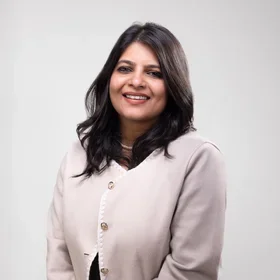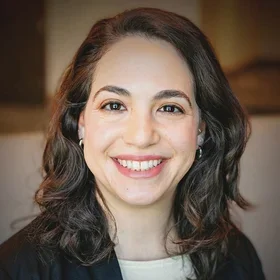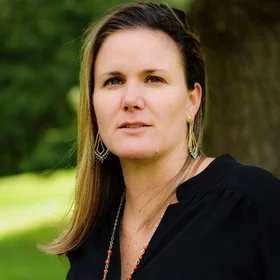Columbia SPS students come from all different backgrounds. But one thing they all share? They’re highly motivated and career-driven. They also credit some of their success to SPS and the opportunities and resources it provided.
Here are some student and alumni success stories:
Audrey Ou (’22SPS, Applied Analytics)
Ou is a cofounder of TRLab, a NFT platform for art collecting and art education, which she launched as a student at SPS. In 2022, Ou partnered with The Calder Foundation, the organization that manages the work of sculptor and artist Alexander Calder, to use NFTs to create an interactive and educational way of allowing students to engage with Calder’s artistic works. Ou said the project is “...an inkling of what’s to come with the next-generation application of NFT technology, where NFTs can be still images or art, but they can also be tokens in a collective experience and, in this case, signifiers of knowledge.”
Paul Bostock (’10SPS, Construction Administration)
Bostock is the founder of TechBear, a company that provides marketing and website services to small businesses.
How did SPS help him along the way? How could it help others?
“SPS brings together this intoxicating blend of working professionals, the energy New York City has to offer, and Columbia all in one room. I was in the first cohort of the Construction Administration program. It was absolutely wonderful. We had people who worked in the public sector for over 20 years. We had people who worked in the public sector for three years. We had architects and trades (HVAC), and all of this brought together the most interesting, dynamic people in all these different worlds that would end up in class that night.”
What SPS taught him about being a successful entrepreneur: “Think about your team first. Assemble the right people. Get a business plan. Execute on the business plan … focus on the team that you build rather than where you’re going.”
Advait Vij (’20SPS, Technology Management) and Tyler Schechter (’20 SPS, Technology Management)
Vij and Schechter are cofounders of QRius Pay, a QR-code payment processor for nonprofits.
“Columbia opened me up to exploring new career paths and inspired me to think of how I could use technology to create a company from scratch,” says Schechter. He adds: “Having done the Columbia program, I understand the opportunity we have before us—and I have the confidence and skills to give it my best try. Personally, I don’t think I would have done this if I hadn’t gone to Columbia.”
Vij: “A lot of people coming to SPS don’t realize the resources that are at Columbia above and beyond SPS. Columbia is like a universe of knowledge. It gives us all of these great resources, and it’s up to us to utilize them.”
Marissa Cuevas (’17SPS, Sustainability Management)
MicroTERRA is an agricultural company focused on turning wastewater into clean water, which can be used for, among other things, animal feed. The company, cofounded by Cuevas, was the winner of the 2021 Greater Good Challenge, earning it $10,000 in seed money. The company was most recently featured in the World Economic Forum’s Technology Pioneers of 2022.
Marissa said that the seed money will be “used to install a Lemna cultivation pilot program in a fish farm in the southeast of Mexico and to scale our Lemna production capacity up to 1 hectare in the next six months. … Very concretely, it will allow us to pay for the infrastructure (machinery and materials) needed to adapt an existing fish pond to the Lemna cultivation, and to dry the Lemna in the farm. This first pilot project will be key to developing the Lemna cultivation process that will then be replicated in all the farms that will be part of our model.”
Jon Zaikowski (’20SPS, Bioethics)
Zaikowski is a cofounder of CapCell Biologics, a biotechnology company that develops drug-delivery technologies. The company has exclusive rights to a NASA-developed technology that uses drug capsules, implanted below the skin, to secrete enzymes that can treat Fabry disease. Fabry disease is a condition where a person does not produce adequate alpha-galactosidase-A enzymes; as a result, they are at risk for kidney failure and serious enlargement of the heart. Since Fabry disease is currently treated by infusions, the drug capsule technology would give patients a more convenient way of receiving their treatment.
Dr. Bobuchi Ken-Opurum (’18SPS, Sustainability Management)
Ken-Opurum is founder of Re-Housed, a tool kit that allows people building their own home to make design decisions that protect against climate-change-related risks like flooding and heat stress.
“The Sustainability Management program deepened my interest and knowledge in climate and global sustainable development, especially in water resources and designing for the built environment. A lot of my courses were dynamic and structured in a way that spurred nonconventional thinking about ways to address climate issues such as flooding. … I met brilliant people from diverse backgrounds—both on campus and in New York City—who provided support during my time at Columbia SPS, when I was planning to pursue a Ph.D., and even professionally today.”
Jennifer Leach ('19SPS, Narrative Medicine) and Marianne Petit (C.P.A., Narrative Medicine)
Leach and Petit discussed what led to “Reclaiming Our Doodles,” an illustrated series on graphic and narrative storytelling in medicine.
Said Leach: “I really enjoyed [the] Illness and Disability Narratives [course] with Marsha Hurst because it gave me a broader lens through which to understand my own mental illness, and the opportunity to see myself as an expert in my own embodied experience. It was here that I was introduced to graphic medicine, which is a genre of comics that tell stories of illness and care, and began to draw my first comics.” While in the program, she explored the “possibilities for narrative medicine to inform career coaching for people who live with chronic illness.”
Leach added that the program was “transformational” and that it had helped her reinvent herself “both personally and professionally.”
Petit, currently a professor at NYU’s Tisch School of Arts, credits the Narrative Medicine program for informing her work as both an educator and an artist. “My work,” she said, “explores storytelling as well as the body. My interests are in combining technology, traditional book arts, and sequential storytelling to create new forms of narrative. I see my experience in the [Narrative Medicine] CPA program as expanding both.”
Naomi Haile (’22SPS, Human Capital Management)
A grant from SPS gave Haile the funding she needed to start her podcast, The Power of Why. “I received the SPS Academic and Professional Development Grant, which is an initiative developed by the School to support students in opportunities and pursuits related to what they’re studying,” said Haile.
“Through the HCM program, I met the chief HR officer at Netflix, Sergio Ezama. … I was really fascinated by his story, the work that he was doing, and his journey before he joined the company. I reached out on LinkedIn, and we scheduled a time to record an episode for the show.” She added: “At Columbia, there’s always a chance to meet great people who are driven and aligned with the ideas that you have—and also folks who can challenge your ideas.”
Lavar Matthews (’23SPS, Human Capital Management), Sofia Rinvil (’17SPS, Negotiation and Conflict Resolution), Danna Lennon-Thomas (’18SPS, Nonprofit Management), and Lacie Pierre (’23SIPA)
In 2021, all four launched the Wash House, a nonprofit community center that aims to break the cycle of poverty affecting communities in Mississippi and provides things like free laundry services and internet access. The Wash House was the winner of the 2022 Greater Good Challenge, which puts SPS alumni and faculty onto teams that then pitch business or nonprofit ideas.


